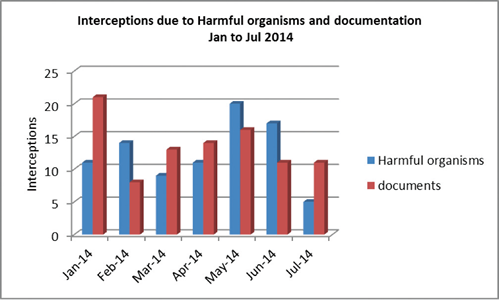 The Kenya Flower Council continues to follow up on the increased number of interceptions at the EU market due to the presence of harmful organisms and most unfortunately, inaccurate documentation. Take note that despite notable improvement, tolerance for both issues is zero.
The Kenya Flower Council continues to follow up on the increased number of interceptions at the EU market due to the presence of harmful organisms and most unfortunately, inaccurate documentation. Take note that despite notable improvement, tolerance for both issues is zero.
To forestall an import ban on the specified products, the EU must be provided with a convincing and objective ACTION PLAN, with clear timelines on outputs, to mitigate against the interceptions.
A meeting held at KEPHIS office on 20th August 2014 by the Horticulture Competent Authority (KEPHIS; Horticultural Crops Directorate; formerly HCDA, PCPB, Kenya Agricultural and Livestock Research Organization KALRO; formerly KARI) and KFC and another held at KFC office on 21st August 2014 between KEPHIS staff, EU consultant and KFC reviewed progress on identified interventions.
Failure to satisfy the EU, that systems to arrest further interceptions on fresh produce destined for the EU market, will escalate the notification to a ban. Interceptions are mainly due to gypsophila, eryngium, solidago, basil, mango and gourds. Most unfortunately, 90% are attributed to documentation. KEPHIS in collaboration with KFC are engaging growers as well as the relevant personnel from the relevant cargo clearing companies, to identify and resolve the root cause of the problems.
Harmful Organisms
- Review of market specific inspection procedures by KEPHIS.
- Profiling of exporters in relation to harmful organisms interceptions reported for corrective actions.
- Revise time spent on inspection from 5 to 7 minutes per consignment.
- Banning of export by all producers for affiliated companies in case of interceptions.
- Meetings with relevant personnel from farms, consolidators and cargo handling companies.
Maximum Residue Levels
- Companies who have violated the MRLs have been banned from exporting until corrective actions are taken.
- KEPHIS & HCD are sampling plant materials from various counties which produce the beans and peas; for lab analysis to create data base for future reference.
- Spray supervisors; who will be used by small-scale farmers have been trained on safe use of pesticides and application procedures to increase efficiency. This is expected to reduce residue on the target crops.
- Destruction of non-conforming crops which has health and safety implications.
- Non-conforming crops manual to be used by inspectors being prepared by KEPHIS.
Documentation
- Poor documentation has resulted in interceptions of flowers and related products
- The responsibility on the poor documentation can be assigned to the producers, inspectors and the airlines/ cargo handlers.
- KEPHIS providing training for documentation clerks
- The wrong information data entry by producers is mainly due to the EU REQUIREMENTS FOR ADDITIONAL DECLARATIONS ON PHYTOSANITARY CERTIFICATES; available in the EU website; http://eu.europa.eu/food/plant/organisms/imports/;
- Number of interceptions from Kenya can be viewed by producers at the EU website http://eu.europa.eu/food/plant/organisms/ imports/
- KEPHIS has observed that the documentation related interceptions increased after the launch of the online phyto- sanitary system in 2011.
- Currently Roses from Kenya have less phyto-sanitary issues at the EU compared to the neighbouring countries.
- There is a need to raise level of compliance at the farms since it is not possible to inspect whole consignments at the exit points.
- Approval of plant protection products specific to crops only.
- PCPB has issued notice on non-conforming plant protection products on the labels.
- Non-conforming plant protection products to be impounded by PCPB.
- Samples of plant protection products have been taken from Naivasha and the general Mt Kenya region for lab quality analysis.
- Random sampling by PCPB of plant protection products for purpose of monitoring quality to continue.
- Handlers of counterfeit products to be prosecuted by PCPB. Some court cases are ongoing at Embu; Kirinyaga and Chuka.
- Awareness course on counterfeiting to be held for the suppliers of pesticides.
